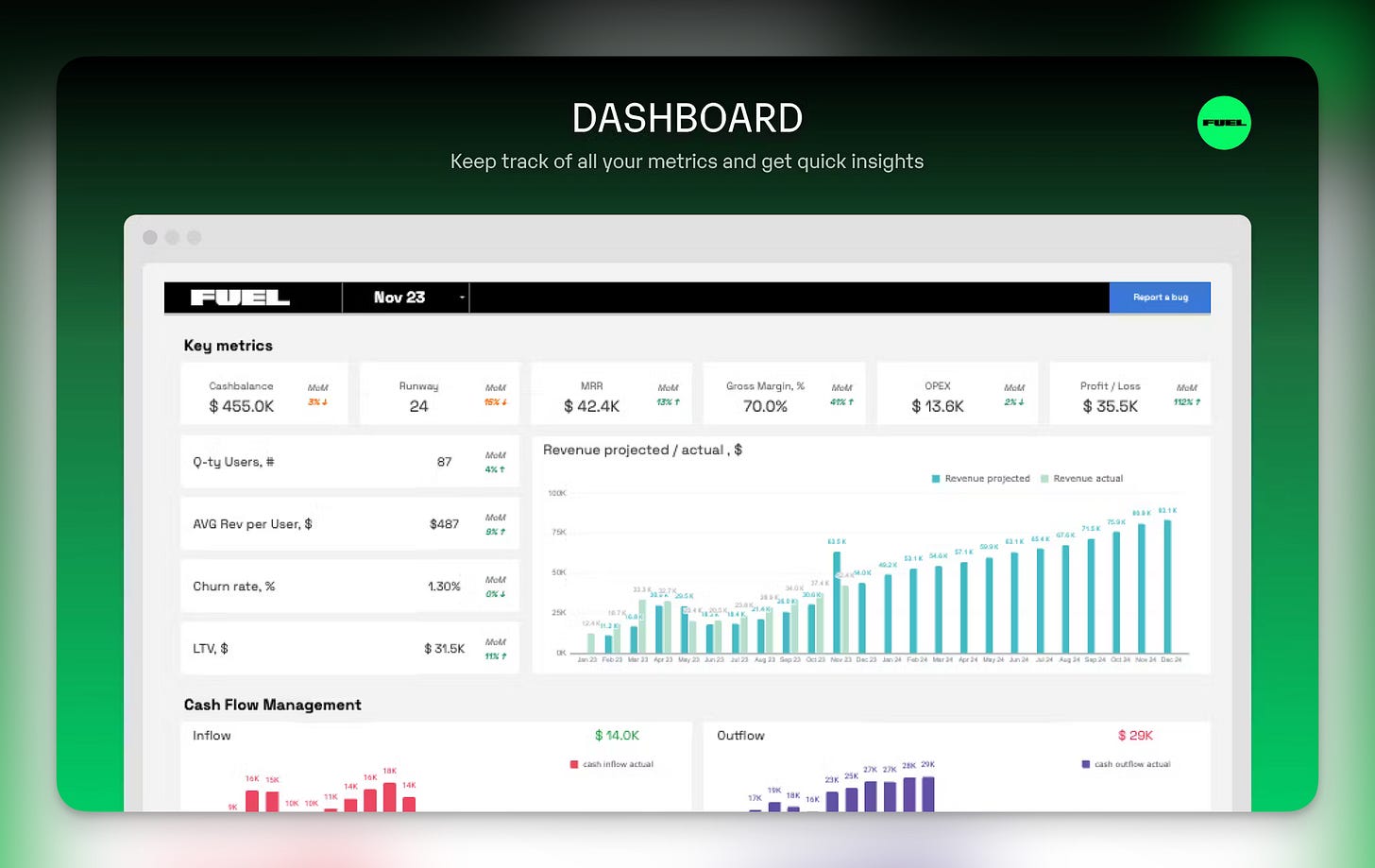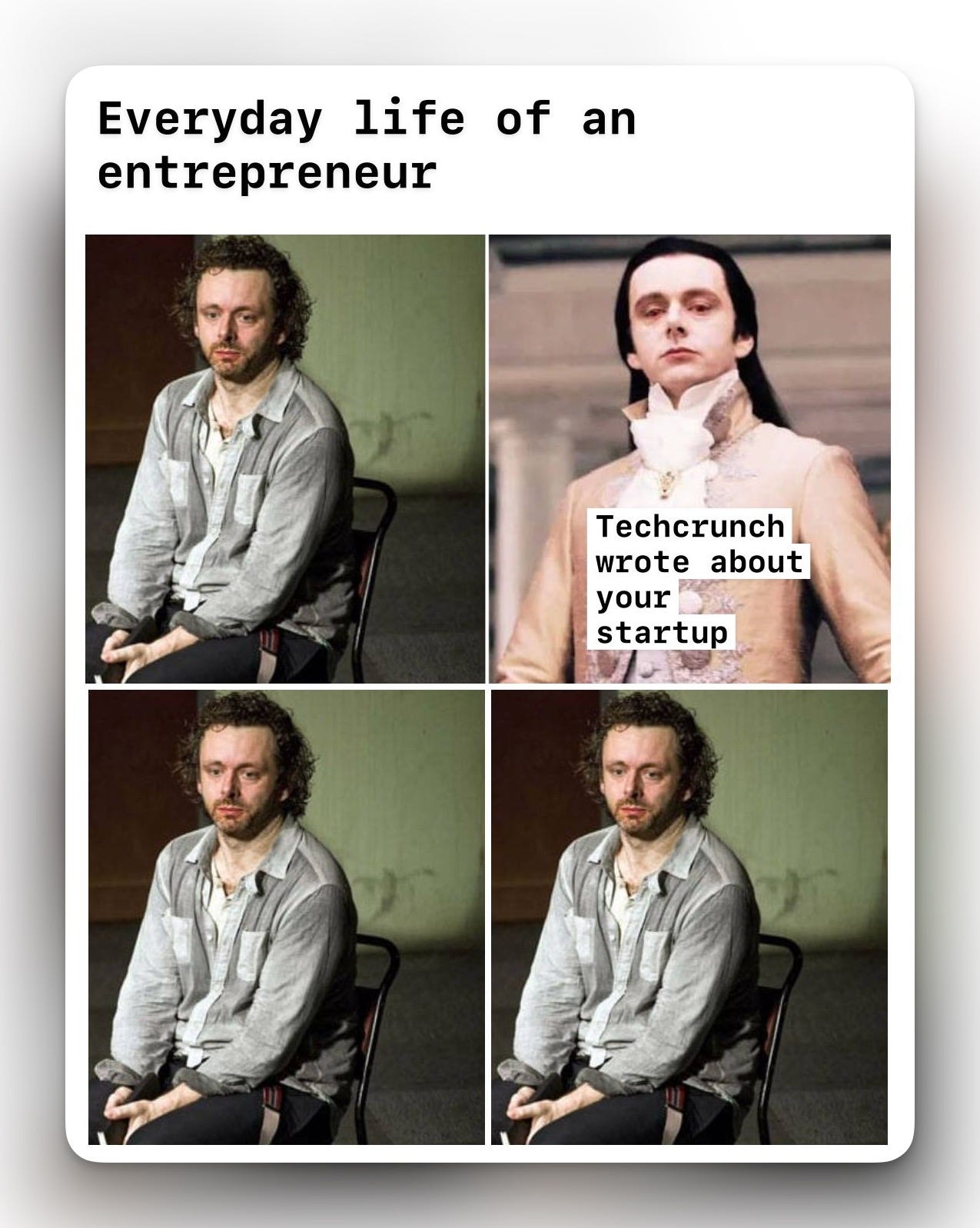🦩 How to write a startup manifesto, a billion for Facebook, and a founder vetting checklist
Migranotes s2e8. Seven useful materials for entrepreneurs for all days of the week
Hi, everyone.
It's time to pour coffee and read a selection of useful materials for startup founders and entrepreneurs. Don't forget to share useful links from it. Sharing is caring!
Here we go 🚀
1. Productivity: Building atomic habits
From time to time, I try some special mobile apps to track my progress in forming habits. I agree with the paradigm that repeating an action for a certain period of time forms an automatic habit. Only for me, it's not 1 month, but two whole months.
The functionality of apps is usually similar - you have to mark the days when you performed the desired action. And that's it. Now I'm experimenting with an app from the authors of the bestselling book Atomic Habits. This is the official app for habit formation from the authors of a book about habit formation.
https://apps.apple.com/us/app/atoms-from-atomic-habits/id6474421906
2. Report: Digital trends from the Cuker agency
I continue to analyze all the reports (in an attempt to analyze market trends in the digital world) that came out at the end of the year. The Cuker agency offered their document, which I liked for its simplicity, where simple theses have an equally simple confirmation.
A few trends that I noticed because I didn't think they were obvious:
Mobile browsing is still growing. In 2022, mobile phones accounted for 61% of website traffic, while desktops and tablets accounted for 39%.
Consumers spend 48%(!) more when their experience is personalized.
The global market for webinars and webcasts will grow by 7.6% from 2016 to 2023.
More than 56% of marketers who invest in influencer marketing work with micro-influencers. Micro-influencers generate up to 60% more engagement than macro-influencers.
https://www.cukeragency.com/forms/digital-trends-report/
3. Startup development: How Yahoo! (almost) bought Facebook, LinkedIn and Twitter
Yahoo! was once one of the first phenomena of the new Internet economy. But after a sharp rise, a long stagnation followed, during which there were several attempts to save the sinking ship. The last of the notable attempts was the hiring of the legendary Marissa Mayer as a savior. Nicholas Carlson wrote a book about her struggle, "Marissa Mayer and The Fight to Save Yahoo." And there is an interesting point about how Yahoo! almost bought Facebook.
Yahoo has been thinking about buying Facebook since Zuckerberg created it in a Harvard dorm room in 2004. Eventually, Zuckerberg said he would agree to the deal, but only if Yahoo offered $1 billion. "We're going to have to do a deal for $850 million, not a billion like you wanted," Yahoo! CEO Terry Semel told Zuckerberg. Zuckerberg remained silent. He looked disappointed. It felt like a betrayal.
Facebook was almost the only startup that Yahoo! almost acquired during the Semel era, but didn't, and then watched it grow into a giant. Yahoo had its eye on LinkedIn and Twitter, two companies that were worth $25 billion in 2014. Yahoo probably could have gotten YouTube. So, that's the story of the "almost".
https://www.amazon.com/Marissa-Mayer-Fight-Save-Yahoo/dp/1455556602
4. Useful services for startups: Bootstrap for your finances
Imagine creating a startup, but without having to think about finances. No, not about the finances themselves, but rather about their management. You still have to deal with money (customers, investments, expenses), but without hiring a CFO.
Bootstrap by Fuel Finance is a comprehensive financial management system that can be customized to fit your business model. It's basically free, and for just $39 per month, you can integrate it with Quickbooks accounting software.
https://fuelfinance.me/bootstrap/
5. Relationships with VCs: How investors check startup founders
Reference checks are a powerful tool for assessing the reliability, competence, connections, and integrity of founders - all predictive signals of their startup's success. Conversely, they can also be useful for identifying serious red flags. It's a kind of mandatory exercise that investors do before making a deal.
Signature Block talks about how to organize the process of checking references, as well as the do's and don'ts based on the practices of investors. I advise entrepreneurs to read this material to understand the prism through which they will be looked at.
A few recommendations for investors from a great article that I recommend all founders to read:
Do this due diligence without fail. If done correctly, references provide insight into the founder's past experience and future potential. It requires additional effort, but it can provide valuable information for portfolio building.
Dig deeper: Investors emphasized the importance of going beyond professional accomplishments and looking deeper into the founder's temperament, work style, and motivation.
Don't just focus on the founder, focus on the people around them. The social network surrounding the founder can serve as a predictive signal of their potential for success.
We have a standard set of questions we ask, including ranking the founder as top 1%, 5%, 10%, or 25% of people the reference knows in a similar capacity. We also ask if the reference would personally invest $25K into the startup."
- Alex Iskold (2048 Ventures)
https://www.signatureblock.co/articles/founder-reference-checks
6. Video: TK Kader on creating your startup manifesto
7. Opinion: Tim Urban about Apple Vision Pro
The best way I can describe how I feel about the Vision Pro is a strange combination of utterly thunderstruck and mildly underwhelmed.
The magical interface, the giant screens, the immersive experiences—they’re just unfathomably cool and awe-inspiring. It feels like a sneak peek at the 2030s.
But after a couple of days, I found myself thinking, “Is that…it?” I had done the small handful of immersive experiences, played some of the small selection of games, looked at a bunch of my panoramic photos, and tried avatar FaceTime—and at the moment, there’s just not that much else to do in the Vision Pro.
The first iPhone left me feeling the same combination of blown away and bored. The phone and I had a torrid honeymoon, but after the novelty of the interface wore off, all it had to offer was the same 16 practical apps.
https://waitbutwhy.com/2024/02/vision-pro.html








Great one! Thanks!